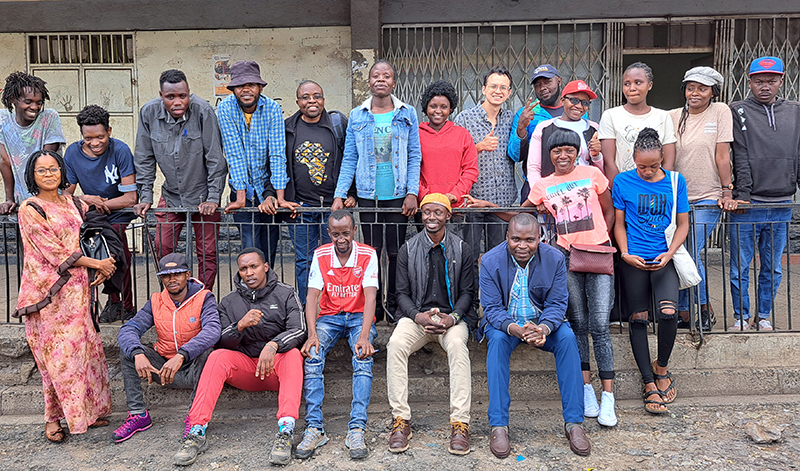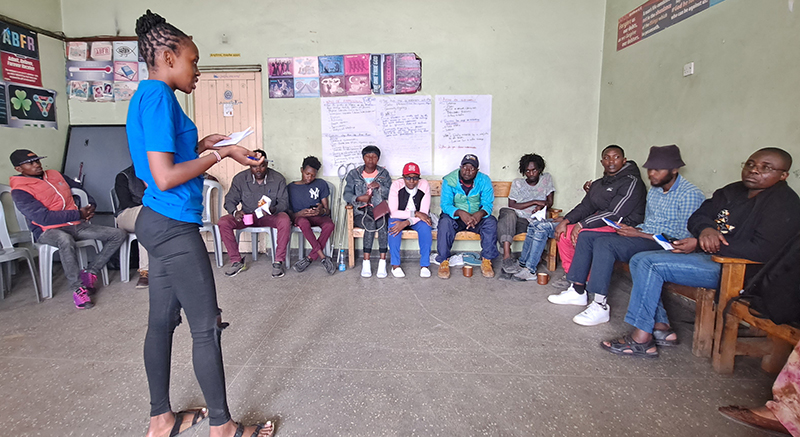
By Guy Blaise Feugap, World BEYOND War Cameroon Chapter, June 15, 2023
In the Global South, anti-democratic practices in times of crisis are emerging as a common problem. This was observed by participants in the new Residencies for Democracy programme, designed to connect people working to solve democracy problems with host organisations with the necessary expertise, under the coordination of Extituto de Política Abierta and People Powered since February 2023. The Cameroon Chapter of WBW is contributing to this project through the Demo.Reset programme, designed by Extituto de Política Abierta to develop collective knowledge about deliberative democracy and share ideas across the Global South, with the collaboration of over 100 organisations in Latin America, sub-Saharan Africa, South-East Asia, India and Eastern Europe.
In sub-Saharan Africa, there is a history of electoral violence linked to non-transparent and non-inclusive democratic processes. Given the security challenges facing these countries and the experience of electoral conflicts on the continent, which have literally plunged some countries into a vicious cycle of war, World BEYOND War seeks to ensure that young people are effectively taken into account in democratic processes. In Cameroon for instance, the most recent elections with public participation were the presidential election on 7 October 2018 and the municipal and legislative elections on 9 February 2020. They have led to tensions added to the security context marked by several conflicts and crises, notably with calls for a boycott of certain political parties, threats and killings of some who have expressed their right to vote or stood as candidates, and the persistent contestation of the results of the October 2018 presidential election. As a result of these facts, it is legitimate to fear, as in 2018, violence during the next elections, with the presidential one taking place in 2025. Mechanisms are needed now to ensure the participation of young people.

This is why, throughout 2022, Cameroon for a World BEYOND War (CWBW) worked on the first phase of the Demo.Reset project, identifying initiatives and key practitioners in the South working on deliberative democracy or democratic innovation. The second phase consisted of an in-person laboratory during which participants identified the main obstacles and challenges facing countries in the South. Some of the ideas for solutions were developed during the residencies, which began in February this year.
During this third phase, participants have developed innovative tools and projects that address common challenges faced by advocates of participatory and deliberative democracy. The process is also designed to enable them to establish linkages with other organisations and practitioners and to learn from experiences and good practices in different regions. For one month (March – April 2023), part of the residency was in-person, in the following countries: Kenya, India, Brazil, Mexico and Argentina. Cameroon for a World BEYOND War worked in Kenya on the prototype for the creation of an “Interactive Platform for Youth Engagement”. For us at World BEYOND War, ending wars and preventing conflicts also require the inclusion of young people in democracy-building processes. We were welcomed to Kenya by the organisation Change Mind Change Future, along with other resident organisations, namely: Extituto de Política Abierta (Colombia), Voice of Africa Foundation (Kenya); and Centre for Peace Advancement and Socio-Economic Development (CPAED-Nigeria), which has recently launched a WBW chapter in Nigeria.
For a month, we travelled through different areas of Nairobi, Mathare and Kisumu, to test and understand different ways of effective participation among young people in the informal sector, considering the current context in which:
- Violent demonstrations are presented as the most effective ways of expression of youths in democracy.
- There are no inclusive and neutral platforms created for deliberations that allow the inclusion of people with limited access to public forums, inflexible schedules, and who have historically been discriminated against in decision-making processes.
- Cultural limitation locked marginalized youth from decision-making processes and low use of media space for public engagement in Deliberative Democracy.
- The framework for exchange between administrative authorities and youth is not very formal or is not grounded in a sustainable interaction that supports youth expression.
- The occupation of political space is a matter of older people, in a context where everything makes to believe that young people cannot be useful. As a result, young people have stopped dreaming that their opinions can be useful. They have somehow abandoned the fight for their political participation, being satisfied with aligning themselves with the old leaders and singing their praises.
During the Democracy Residencies we also tried to understand what platforms the local chiefs and administrators are using to engage youth in public participation, to share with them the findings (ways of expression shared by youth) to assess if they are capturing their needs. At the end it was the opportunity to get to know stakeholders working in the field of participatory and deliberative democracy in Kenya, to learn from their work and build relationships. We will keep engaging with them to agree on an integrated platform for effective participation among people that can work in Kenya and also in other African countries from the Global South.










3 Responses
Dear Guy,
Thank you for taking time to write this wonderful piece of experience about Democracy Residency we had together in Kenya. Words cannot totally express it but the legacy we have created, stand the test of time. Best Regards
Thank you so much Jane, it was indeed a great experience that brings lots of hope for our democracy. Congratulations for taking WBW forward in Nigeria!
Regards
Hello,
Is there a WBW chapter in Senegal?
Thank you,
Marion